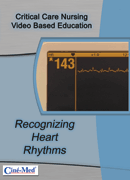Recognizing Heart Rhythms

| Product Details | |
| Product ID: | CCN03 |
| Year Produced: | 2008 |
| Length: | 23 min. |
Abnormal heart rhythms, or dysrhythmias, result when the heart rate is irregular, too fast, or too slow or when electrical impulses travel along abnormal pathways through the heart. Electrocardiography is a simple, yet definitive, noninvasive, diagnostic test that can detect deviations from normal cardiac activity. Electrocardiogram (ECG) readings provide evidence that the heart is generating electrical activity. The ECG provides information about the part of the heart that triggers each heartbeat, the nerve conduction pathways of the heart, and the rate and rhythm of the heart contractions. Leads placed on the various parts of the body measure the magnitude and direction of electrical currents in the heart during each heartbeat. Interpretation of ECGs is a skill that develops only with practice. This course will review the various components of a single cardiac cycle. It will also provide a framework for rhythm analysis by describing how individual components of a cardiac cycle vary with different types of dysrhythmias.
Learner guide and post-test included on accompanying CD (PDF)



